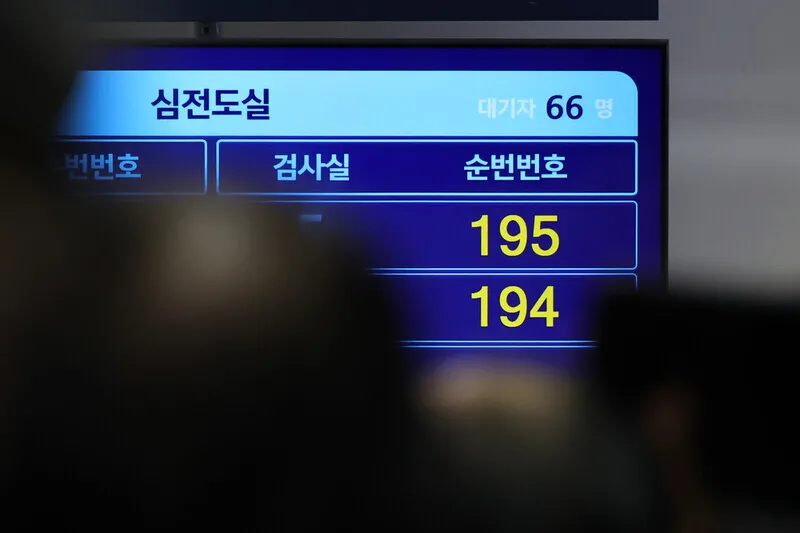hankyoreh
Links to other country sites 다른 나라 사이트 링크
Korea raises public health crisis level to ‘severe’ as country’s trainee doctors tender resignations en masse

As the number of medical residents and interns in Korea who have submitted resignations in opposition to a plan to increase placements at medical schools has increased to 9,275, the government has elevated the public health and medical crisis to the highest level of “severe.” Following the departure of trainee doctors, emergency rooms at major hospitals are turning away patients and sending them to general hospitals in the area.
Korea’s Ministry of Health and Welfare raised the level of the public health and medical crisis from “serious” to “severe” in a meeting on Thursday. As of 10 pm on Wednesday, 9,275 trainee doctors at 100 hospitals around the country — where 95% of all interns and residents work — had submitted their resignations, and 8,024 of them had not reported to work.
The ministry sent back-to-work orders to 6,038 trainee doctors whose absences it confirmed through onsite inspections.
The country’s Ministry of Education reported on Wednesday that 3,025 medical students submitted requests to take a hiatus from their studies at 22 schools around the country. Combined with 8,753 students who did the same on Tuesday, a total of 11,778 medical students have now requested to pause their studies, representing 63% of the country’s medical students.
Samsung Medical Center cut the number of surgeries by 45% compared to its ordinary workload, while Seoul National University Hospital, Asan Medical Center and Seoul St. Mary’s Hospital reduced their surgery workload by around 30%. Severance Hospital halted emergency treatment for 10 conditions, including emergency eye procedures.
Trainee doctors make up 30%-40% of the doctors on staff at these hospitals. With major hospitals understaffed, patients had no choice but to delay their surgery or to visit a smaller hospital in the area.
A government-funded support center handling reports about harm suffered as a result of the trainee doctors’ collective action said that 57 instances of harm were reported on Wednesday (as of 6 pm) and that 44 operations had been delayed.
The government and doctor lobbies accused each other of making false claims.
“The doctor lobbies are citing a 2.84% yearly rate of increase in the number of doctors between 2010 and 2022. But when we account for the fact that more doctors are retiring because of old age, the rate of increase falls to 1.67%. We’re urging [the doctors] to resolve this issue through discussion and debate,” said Second Vice Health Minister Park Min-soo in a briefing on Thursday.
The Korean Medical Association’s emergency action committee dismissed as a “lie” the government’s claim that it had discussed raising medical school placements with the KMA several times.
The Korean Intern Resident Association expressed concerns that increasing placements at medical schools would lead to less income.
Park Dan, head of KIRA’s emergency action committee, addressed the government’s plan to let more students into medical school during an appearance on “Kim Hyeon-jeong’s New Show” on CBS radio on Thursday.
“We’re concerned that they’re trying to make hospitals even cheaper by increasing the number of residents and interns, who work over 80 hours a week on the cheap,” Park said.
As for the government’s package of policies for essential medical services, Park said, “The package ought to at least detail how they mean to raise funds for dealing with these issues.”
In a related development, the government and the medical community are planning to hold a public debate. Park Min-soo, the second vice health minister, and Kim Taek-woo, the head of the KMA’s emergency action committee, will be debating the increased cap on medical school admissions on KBS 1TV at 3:30 pm on Friday.
By Lim Jae-hee, staff reporter; Cheon Ho-sung, staff reporter
Please direct questions or comments to [english@hani.co.kr]

Editorial・opinion
![[Correspondent’s column] Coupang’s game in Washington follows familiar pattern [Correspondent’s column] Coupang’s game in Washington follows familiar pattern](https://flexible.img.hani.co.kr/flexible/normal/500/300/imgdb/original/2025/1226/8217667391873536.jpg) [Correspondent’s column] Coupang’s game in Washington follows familiar pattern
[Correspondent’s column] Coupang’s game in Washington follows familiar pattern![[Editorial] Coupang’s attempt to hide behind US won’t win back Korean consumers [Editorial] Coupang’s attempt to hide behind US won’t win back Korean consumers](https://flexible.img.hani.co.kr/flexible/normal/500/300/imgdb/original/2025/1226/1817667387971465.jpg) [Editorial] Coupang’s attempt to hide behind US won’t win back Korean consumers
[Editorial] Coupang’s attempt to hide behind US won’t win back Korean consumers- Coupang under fire for possible obstruction of investigation into its customer data leak
- [Editorial] Coupang founder’s contempt for workers, customer security knows no bounds
- [Column] Confessions of a Coupang-holic
- [Editorial] Kim Bom-suk’s arrogance on full display in boycott of Coupang leak hearing
- [Editorial] The facts of Yoon’s insurrection are clear — justice cannot be further delayed
- [Column] Trump destroys government
- [Column] A post-Western world approaches
- [Column] Offshore balancing, or carving out spheres of influence?
Most viewed articles
- 1Korea to trial next-gen train capable of sub-2-hour Seoul-Busan trip starting 2030
- 2Kim Jong-un’s hidden motive in criticizing South Korea’s nuclear submarine push
- 3[Editorial] Coupang’s attempt to hide behind US won’t win back Korean consumers
- 4Coupang under fire for possible obstruction of investigation into its customer data leak
- 5[Correspondent’s column] Coupang’s game in Washington follows familiar pattern
- 6Real-life heroes of “A Taxi Driver” pass away without having reunited
- 7Moon Jae-in renews call for end-of-war declaration, peace treaty on Korean Peninsula
- 8Chang Chun-ha’s family hopes to know truth of his death after 37 years
- 9Chinese money flooding into South Korean companies
- 10Russian architect personally witnessed Empress Myeongseong’s assassination by Japanese ronin, accoun